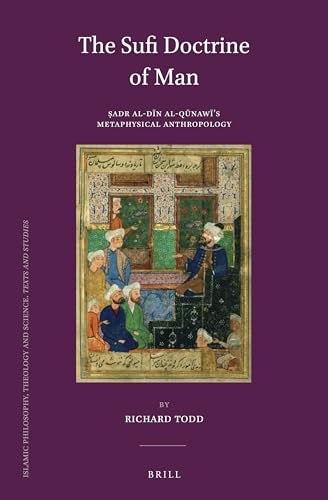The Sufi Doctrine of Man
Sadr al-Din al-Qunawi's Metaphysical Anthropology (Islamic Philosophy, Theology and Science, 90)
Richard Todd
BOOK REVIEW

In the intricate tapestry of Islamic philosophy, few threads shine as brightly as the life and work of Sadr al-Din al-Qunawi. His exploration of the human condition is nothing short of a metaphysical odyssey. In The Sufi Doctrine of Man: Sadr al-Din al-Qunawi's Metaphysical Anthropology, Richard Todd navigates this profound landscape, inviting readers to uncover the depths of human nature through the lens of Sufi thought.
The essence of al-Qunawi's philosophy challenges the very frameworks of understanding existence as he encourage us to not only reflect upon our physical selves, but to delve deeper into the spiritual dimensions that define our humanity. Imagine walking through a garden of wisdom where every petal and thorn represent aspects of the soul. The metaphor is vivid, yet Todd manages to harness this imagery in a way that feels both enlightening and urgent; we must awaken to comprehend the metaphysical makeup that binds us.
Todd's examination is not merely academic; it emerges as a passionate discourse that resonates with the existential struggles many of us face today. His interpretation of al-Qunawi's work illuminates the Sufi perspective on the individual as a microcosm of the universe-an essential reflection that compels you, dear reader, to question: Who am I in this vast cosmos? Through the lens of metaphysical anthropology, this question becomes not just an inquiry, but a daring expedition into one's own essence.
While some readers may approach this work with skepticism, feeling the weight of academic jargon, Todd dismantles such barriers with articulate prose and insightful commentary. He deftly balances the complexities of al-Qunawi's ideas while making them accessible, allowing even the most inquisitive newcomer to Sufi philosophy to engage deeply with the material. Yet, the book's brilliance has also ignited debates: some laud its spiritual depth, asserting that it acts as a bridge to understanding the divine, while others find its metaphysical approach daunting, at times overly abstract for a practical application in today's world.
Engaging with Todd's resplendent text, one cannot dismiss the historical backdrop against which al-Qunawi crafted his thoughts. Living in the 13th century during a period rife with intellectual flourishment in the Middle East, he was influenced by a myriad of philosophical currents, including Neoplatonism and Islamic mysticism. As Todd articulates, this intersection not only reflects al-Qunawi's grasp on metaphysical concepts but also speaks to a broader narrative of human intellectual evolution.
As you peel back the layers of Todd's exploration, the reader is confronted with the sheer audacity of al-Qunawi's claims. His philosophy posits that the human being is not merely a vessel of physical existence but a beacon of divine attributes. This notion is a clarion call-to realize that our essence transcends the mundane, connecting us to a higher reality. The implications are staggering; we are urged to reconsider our day-to-day existence in relation to the cosmos, prompting an awakening that is both thrilling and terrifying.
Moreover, the responses from readers speak volumes. Some express profound gratitude for the spiritual awakening ignited by the book, sharing personal testimonies of transformation through its teachings. Others, however, lament a disconnection with the esoteric, feeling lost in the philosophic labyrinth Todd artfully constructs. This dichotomy highlights the very essence of al-Qunawi's work-its ability to evoke such polarizing reactions speaks to the weight of the themes presented.
This book serves as more than a mere academic study; it is a vessel for transformation, a means to navigate the complexities of existence. Richard Todd does not simply present al-Qunawi's thoughts; he insists that we engage with them, reconsidering our own identities as we examine what it means to be human.
Dare to embark on this philosophical journey. As Todd guides you through the labyrinth of al-Qunawi's metaphysical anthropology, prepare for a tumultuous ride-one that might just shatter your preconceived notions and reshape your understanding of existence itself. This is not just a reading; it is an awakening that calls for your active participation. With every turn of the page, urge yourself to go deeper-into understanding, into spirituality, into the very core of what it means to be human. You may not return the same. 🌌
📖 The Sufi Doctrine of Man: Sadr al-Din al-Qunawi's Metaphysical Anthropology (Islamic Philosophy, Theology and Science, 90)
✍ by Richard Todd
🧾 228 pages
2014
#sufi #doctrine #man #sadr #qunawis #metaphysical #anthropology #islamic #philosophy #theology #science #richard #todd #RichardTodd